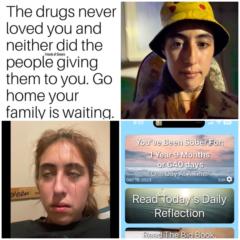Jul 31 • Daily Wins
19 Months of Continuous Self-harm Recovery ❤️🩹
Yesterday July 30th 2025 I made it to 1 Year 7 Months / 19 Months / 578 Days Clean from destructive Self-harm habits this is a big accomplishment for me marking significant growth and resilience in the face of my longest-standing battle with self-harm addiction. This journey began when I was under 14, over 8 years of struggling with emotional pain and life's disappointments, unexpected losses and challenges that lead to relocating often resorting to self-destructive behaviors. This milestone signifies my progress and determination to overcome these challenges. There is always hope, even in the darkest moments. I spent days relapsing, feeling defeated hour after hour, but I finally found the courage to overcome my struggles by reaching out for help. It wasn't easy; asking for help is often the most daunting task. However, I'm grateful I took that step, and I want others to know that dying isn't the answer – overcoming and living is. Recovering from self-injury requires a comprehensive approach that addresses physical, emotional, and psychological well-being your not alone Consulting a mental health professional, such as a therapist or counselor, can be incredibly beneficial in identifying the root causes of self-harm and developing effective coping strategies. Recognizing situations, emotions, or thoughts that lead to self-harm is crucial, and developing plans to manage them can help prevent future instances. Additionally, finding healthy alternatives to self-harm, such as exercise, mindfulness, creative activities, or talking to a trusted friend or family member, can provide a sense of relief and support. Create a support network that truly understands you and your struggles and strengths. Surround yourself with caring individuals, join support groups, or participate in online communities that share your experiences. Make self-care a priority: engage in stress-reducing activities like meditation, yoga, or deep breathing exercises to promote relaxation. Learn self-compassion by treating yourself with kindness, understanding, and patience. To overcome challenges, consider seeking professional help from a therapist to address underlying concerns such as trauma, anxiety, or depression. Additionally, prioritize your physical well-being by focusing on proper nutrition, adequate sleep, and regular exercise. Writing down your thoughts and feelings in a journal can also help you process emotions and recognize patterns. Don't forget to acknowledge and celebrate the all the small milestones in your recovery journey every hour in recovery is a accomplishment. Make every day count one second one heartbeat one breathe one minute one hour one day at a time We Do Recover One Day At A Time All Day Everyday Just For Today Process I Recover Out Loud Because I Almost Died Silently By Myself
1:30
0:15
1
2 comments
powered by

skool.com/keep-going-movement-3520
This community is recovery-focused. It brings together sober people, those supporting loved ones, and anyone seeking strength in their journey.
Suggested communities
Powered by
